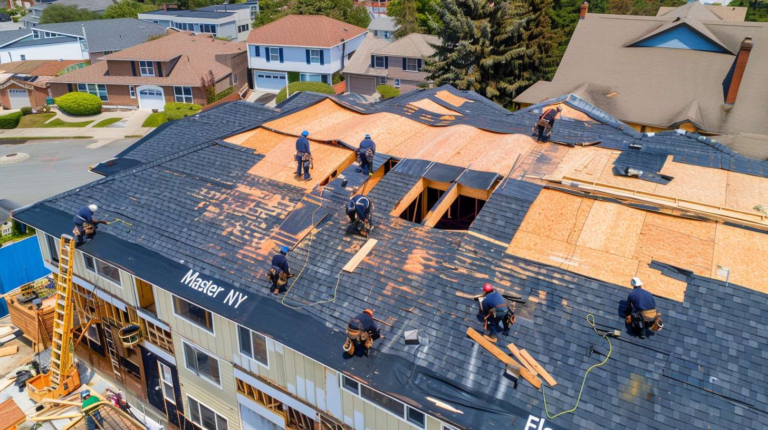Professional Flat Roof Installation Contractors Near You
Look, I'll be straight with you about flat roofing in Queens - it's not just about slapping down some membrane and calling it done. After twenty-three years installing flat roofs from Astoria to Jamaica, I've seen what happens when contractors cut corners, and trust me, you don't want to deal with that mess come winter.
The thing about flat roofs here in Queens is they take a beating from our weather. You've got the humidity rolling in from the East River, those brutal nor'easters that seem to find every weak spot, and don't get me started on what happens when your drainage backs up during one of those August downpours.
What Makes a Quality Flat Roof Installation Contractor
Here's what I tell everyone who calls Flat Masters NY asking about flat roof installation contractors - not all of us are created equal. A real flat roofing installation contractor isn't just someone with a truck and some tools. We're talking about understanding membrane compatibility, proper substrate preparation, and knowing exactly how Queens' building codes apply to your specific situation.
My crew and I have installed everything from single-ply EPDM on those classic brick apartment buildings in Elmhurst to high-end TPO systems on commercial properties along Queens Boulevard. Each material has its place, but the installation process? That's where experience separates the professionals from the fly-by-night operations.
When we're evaluating a new flat roof project, the first thing I look at isn't the existing roof - it's the building itself. How old is the structure? What's the deck condition? Is there proper insulation? Because here's the thing nobody tells you: a beautiful new roof membrane over a compromised deck is just expensive disaster waiting to happen.
Flat Roof Installation Materials We Work With
EPDM rubber roofing remains my go-to recommendation for most residential flat roofs in Queens. It's proven, it handles our temperature swings beautifully, and when properly installed, I've seen these systems last thirty years without major issues. The black membrane does absorb more heat during summer, but that's manageable with proper ventilation design.
TPO is where we're seeing a lot of growth, especially for commercial applications. It's white surface reflects heat, which building owners love for energy savings, and the welded seams create a completely watertight system when done correctly. But - and this is important - TPO installation requires specialized equipment and training. Not every flat roof installation contractor has invested in the proper tools.
Modified bitumen still has its place, particularly on larger commercial buildings where we need that extra durability. The torch-down application creates an incredibly strong bond, though it requires experienced installers who understand fire safety protocols. Last month we completed a 15,000 square foot modified bitumen installation on a warehouse in Long Island City - took three days with a six-man crew, but that roof will outlast the building.
The Installation Process That Actually Works
Every proper flat roof installation starts with complete tear-off. I don't care what the previous contractor told you about "overlay systems" - in Queens' climate, you want to start with a clean deck. Period. We remove everything down to the structural deck, inspect for any damage, and make necessary repairs before moving forward.
Insulation placement is critical and it's where I see a lot of contractors make costly mistakes. The R-value requirements in New York City are specific, and improper insulation creates thermal bridges that lead to condensation issues. We use polyiso boards in most applications, mechanically fastened with specific patterns based on the building's wind load requirements.
Base sheet application comes next, and this is where attention to detail separates good work from excellent work. Every seam needs to be properly overlapped, every penetration requires custom flashing, and the membrane adhesion must be uniform across the entire surface. My foreman Miguel has been doing this for fifteen years, and he still checks every square foot personally.
Drainage integration isn't an afterthought - it's planned from day one. Queens gets serious rainfall, and inadequate drainage causes more flat roof failures than material defects. We slope everything toward the drains, install overflow drains where required by code, and make sure every penetration is properly sealed and flashed.
Why Location Matters for Flat Roof Installation
Installing flat roofs in Queens isn't the same as doing the work in Manhattan or Long Island. Our neighborhood regulations vary significantly - what flies in Flushing might not meet requirements in Forest Hills. Plus, the salt air affects material selection, especially if you're near the water in areas like Rockaway or College Point.
Building access presents unique challenges here. Those narrow streets in Woodside? Good luck getting a crane truck positioned properly. Row houses in Ridgewood with shared driveways? We've learned to work with hand-carried materials when necessary. It's not just about knowing flat roofing - it's about understanding how to execute quality work within Queens' practical limitations.
The inspection process here requires local knowledge too. Queens has its own building department quirks, and knowing which inspectors focus on which details can save weeks of project delays. After doing this for two decades in the same area, we know exactly what documentation each inspector expects and how to present the work for smooth approval.
Common Flat Roof Installation Problems
I can't tell you how many emergency calls we get because someone hired the wrong flat roofing installation contractor. Ponding water is the big one - when drainage isn't properly planned and executed, water sits on the membrane, eventually finding its way through seams or causing membrane degradation.
Improper flashing around penetrations causes more leaks than any other single issue. Those HVAC units, vents, and parapets all require custom metalwork, and there's no shortcut that works long-term. We fabricate most of our flashing on-site because every building presents unique geometry.
Adhesion failures happen when contractors rush the process or use incompatible materials. I've seen beautiful-looking installations fail within two years because someone used the wrong primer or didn't allow proper curing time. Weather conditions during installation matter enormously - you can't apply most membrane systems in wet conditions or extreme temperatures.
What to Expect During Installation
A typical residential flat roof installation takes three to five days, depending on size and complexity. Commercial projects obviously take longer - that warehouse job I mentioned earlier was scheduled for a week, though we finished early due to good weather cooperation.
Day one is always tear-off and deck inspection. We protect the interior with plastic sheeting and tarps, though honestly, some dust and debris is unavoidable. Day two focuses on insulation and base preparation. Days three and four handle membrane installation, flashing, and detail work. Final day covers cleanup, inspection, and testing.
We test every installation with a flood test - actually putting water on the roof to verify drainage function and check for leaks. It's more work, but finding problems during installation beats getting emergency calls six months later.
Choosing Your Flat Roof Installation Contractor
Experience matters, but local experience matters more. Ask any contractor you're considering about specific Queens projects - where, when, what materials, what challenges they encountered. Real experience produces specific answers, not generic responses.
Licensing and insurance aren't optional. New York requires specific contractor licensing, and liability insurance minimums are substantial for good reason. Don't assume - verify everything independently. The city's website lets you check contractor license status, and insurance certificates should come directly from the insurance company.
References should be local and recent. I'm happy to provide contact information for customers whose roofs we've completed in the past two years. Good work speaks for itself, and satisfied customers don't mind sharing their experience.
At Flat Masters NY, we've built our reputation on quality flat roof installations that last. Every project gets the same attention to detail, whether it's a small residential repair or a major commercial installation. When you're ready to discuss your flat roofing needs, give us a call at (917) 994-7618. We'll provide a detailed assessment and honest recommendations based on your building's specific requirements.
Your roof protects everything underneath it. Make sure you choose a flat roof installation contractor who understands that responsibility.


